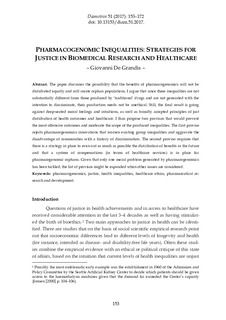Pharmacogenomic Inequalities: Strategies for Justice in Biomedical Research and Healthcare
Journal article, Peer reviewed
Published version
Permanent lenke
http://hdl.handle.net/11250/2465453Utgivelsesdato
2017Metadata
Vis full innførselSamlinger
Originalversjon
Diametros : An Online Journal of Philosophy. 2017, 51 153-172. 10.13153/diam.51.2017.1036Sammendrag
The paper discusses the possibility that the benefits of pharmacogenomics will not be distributed equally and will create orphan populations. I argue that since these inequalities are not substantially different from those produced by ‘traditional’ drugs and are not generated with the intention to discriminate, their production needs not be unethical. Still, the final result is going against deep-seated moral feelings and intuitions, as well as broadly accepted principles of just distribution of health outcomes and healthcare. I thus propose two provisos that would prevent the most offensive outcomes and moderate the scope of the produced inequalities. The first proviso rejects pharmacogenomics innovations that worsen existing group inequalities and aggravate the disadvantage of communities with a history of discrimination. The second proviso requires that there is a strategy in place to even out as much as possible the distribution of benefits in the future and that a system of compensations (in terms of healthcare services) is in place for pharmacogenomic orphans. Given that only one moral problem generated by pharmacogenomics has been tackled, the list of provisos might be expanded when other issues are considered.

